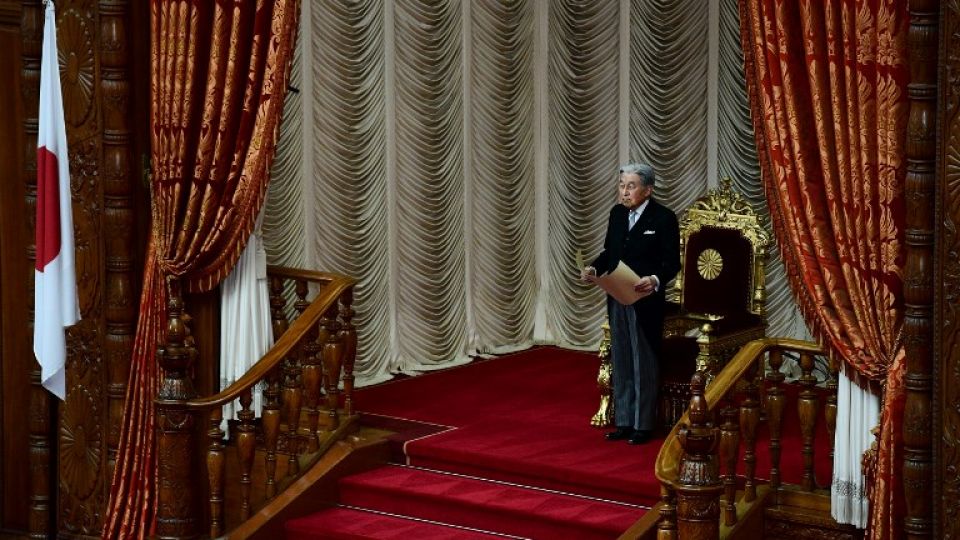February 3, 2019
The Japanese Emperor Akihito is due to abdicate later this year.
Three months remain in the Heisei era. Unlike the previous era change brought about by the death of Emperor Showa, the upcoming transition is characterized by a festive mood.
Retailers are engaging in a marketing war as they entice consumers with “Last Heisei” sales, while bridal companies are preparing for a wave of “last-ditch marriages” in which couples wed before the end of the era.
The Loft, a leading variety store in Shibuya, Tokyo, put up an advertisement with the message, “We’re daring to ‘bring back’ giri-choko for the last Valentine’s Day of the Heisei era.” The campaign seeks to upend the gradual decline of giri-choko, chocolates that women give to their male colleagues or friends only out of a sense of obligation.
The store also set up a special booth stocked with Valentine’s Day goods, attracting shoppers with reminders that this year’s Valentine’s Day is the last of the Heisei era.
“I’m going to give out lots of chocolates because it’s the last Valentine’s Day of Heisei,” a female vocational school student, 19, said while shopping.
According to The Loft, chocolates inscribed with messages of gratitude are popular this year.
“The number of people who give giri-choko at their workplace and others has fallen. But, this year, giri-choko are seen as a good way to convey gratitude to people they have interacted with in the Heisei era,” Loft public relations official Yui Takahashi said.
Tokyo-based online chocolate retailer All Stadium Co. is selling “Heisei Saigo no Valentine Choko” (Chocolates for the last Valentine’s Day of the Heisei era). The package’s backside displays the message, “Thank you for your kindness in the Heisei era, and thank you in advance in the next era, too.” Sales of the product are more than eight times higher than the company’s initial estimate.
Many other outlets have begun sales of Heisei-themed products. Snack maker Koike-ya Inc. began sales Tuesday of “Heisei Saigo no Potato Chips” (Last potato chips of the Heisei era), with bags for the chips displaying buzzwords from the era such as “bubble economy” and “education without cramming.”
At Daimaru Matsuzakaya Department Stores, a pure gold coin with the inscription “Heisei” is selling for ¥1 million (about $9,100), tax included, with smaller coins going for ¥300,000.
The bridal industry has launched a campaign capitalizing on the change in eras. The Yokohama Bay Hotel Tokyu in Nishi Ward, Yokohama, is promoting a “last-ditch marriage plan” targeting couples who plan to hold wedding ceremonies by the end of April. The package includes a cruise tour in which couples can view Yokohama Bay Bridge from a boat, as the bridge opened in the first year of the Heisei era in 1989.
The number of couples who have booked weddings for April is 40 percent higher compared to the same month last year. Many people are eager to “hold a wedding ceremony in the Heisei era that’s filled with their memories,” a hotel spokesperson said.
The expression “the last … of the Heisei era” has likewise featured prominently on social media.
According to NTTCom Online Marketing Solutions Corp., an estimated 4.66 million tweets have included the hashtag “#HeiseiSaigo” over the past year. On Christmas Eve and New Year’s Eve, 70,000 to 100,000 tweets had the tag each day.
Last November, Tokyo-based private research company Cross Marketing Inc. conducted an online survey of 3,000 people aged 20 to 79 about the change in eras. Asked whether they had thought about the “end of the Heisei era” over the past one-year period, 29 percent of respondents who were adults during the previous era change replied yes, while 40 percent of respondents in their 20s who were born in the Heisei era replied similarly.
“Those who were born during Heisei must’ve been aware that this is their era,” the company’s spokesperson said.
NLI Research Institute senior researcher Naoko Kuga said: “Young people in the Heisei era are frugal in how they spend money. How to incorporate the nature of events into products and services will be key to increasing their consumption.


